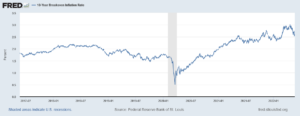May 23, 2022
Sorry folks, I’m back!!!! Anyhow, I was following the news the last few weeks and was struck by a couple of items that seem to have gotten little attention.
First, on inflation, we have seen a sharp fall in the break-even inflation rate for inflation-indexed 10-year Treasury bonds compared with conventional Treasury bonds. This break-even rate had been rising through the fall and winter, peaking at just over 3.0 percent on April 21.
Anyhow, it has since fallen sharply, and stood at 2.6 percent on Monday. This is still somewhat higher than the Fed’s 2.0 percent inflation target, but not by much, since everyone expects higher inflation in 2022 and there is around a 0.3 percentage point gap between the CPI, which is the basis of the index and the PCE deflator than the Fed targets.
The drop in this break-even rate deserves more attention than it’s getting. As someone who warned of both the stock bubble in the 1990s and the housing bubble in the ‘00s, I am well aware that markets can be wrong, but it is still worth paying attention to what they are telling us.
Rather than seeing a story of spiraling inflation, actors in financial markets seem to be expecting that the inflation rate will quickly fall back to more moderate levels. That is worth noting.

The other issue is the plunge in the stock market that has upset many people, including some self-identified liberals. There all sorts of factors, both rational and irrational, that can explain stock market movements, but in principle, the stock market is supposed to represent the discounted value of future corporate profits.
Many of us have noted that the pandemic inflation has been associated with a sharp shift from wage income to profit income, with the latter rising by roughly 2 percentage points of corporate income. The immediate trigger for the latest plunge was reports from Target and Amazon that they are seeing increasing pricing pressure, and therefore lower profit margins, on a wide range of goods.
Let’s suppose that this is the beginning of a reversal in profit shares, with the possibility that they will return to their pre-pandemic level. This is what many of us had been hoping for.
But what would be the predicted effect on stock prices of a drop in profit shares of roughly 2 percentage points, or 10 percent of current profits? That’s right, we would expect a plunge in stock prices. The good news for workers here (lower prices mean high real wages) is bad news for the stock market.
Too early to say if this is in fact the story, but if it is, progressives should be happy.







Comments